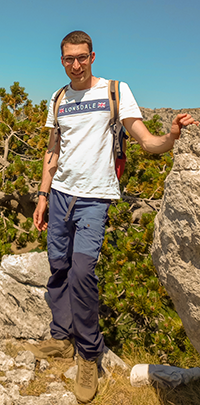Plant Dive Lab
About us
Professors and researchers

Full Professor (Topics 1 and 4) - Teaching: Plant Biology, Forest Plant Diversity and Ecology
The analysis of plant diversity in a taxonomic, phylogenetic, ecological and functional perspective is the general topic of my research activities. I especially focus on European temperate forests, Mediterranean habitats and harsh environments, such as ultramafic soils. Since 1999 I have been teaching Plant Biology, Systematics and Forest Biodiversity at the University of Florence, hoping to pass some of my experience to students and young researchers with the same interests.

Associate Professor (Topic 3) - Teaching: Plant biology, Tropical Plant Ecology
Ethnobotany is a branch of botany investigating the relationship between plants and indigenous societies; an important relationship supporting the daily livelihood of many traditional communities. In particular my research focuses on the study of wild medicinal plants and wild food plants used by people living in rural areas of tropical countries. What I like about my job is the opportunity to meet people of different cultural and social context, discovering that they have a lot to teach us about the understanding and the sustainable management of the ecosystem.

Associate Professor (Topic 2) - Teaching: Plant Biology, Forest botany
Forest tree responses to environmental changes and stress are my main research interests. The study of the ecological dynamics and physiological mechanisms behind tree responses to environmental factors has been the topic of my research since my degree thesis. I work especially using ecophysiological methods, including plant traits and chlorophyll fluorescence analysis, plant gas exchange and dendroecology approaches (tree rings analysis, stable isotopes). Tree growth, forest biodiversity and monitoring of forest tree health and functioning are also topics of my research activities.

Research Scientist (Topic 1 and 2) - Teaching: Applied botany
My main scientific interest concerns the effects of disturbances on forest vegetation. I find forests fascinating, especially their way of responding to upsetting events. I work especially on the dynamics concerning ground vegetation in terms of productivity, composition, diversity, and adaptive strategies. I have also experience in monitoring abiotic stress on forests and in the relationship between plants and air quality. Another aspect of my background is the management and protection of historic gardens, with particular attention to the effects of climate change on their trees.
Research contracts and Post-Docs

Post-Doc (Topic 1)
Graduated in Natural Sciences with a master’s thesis titled "Peatlands of the Tuscan-Emilian Apennines: flora, vegetation, ecology", my scientific interests range from Floristics, Mediterranean plant community ecology, Biological invasions as well as Ornamental flora of historical gardens and Botanical garden’s living collections.
My work’s program within Plant Dive Lab primarily aims to monitor plant diversity of Italian forest communities through ecological-vegetation surveys, in order to reveal their structural and functional complexity.
In fact, the study of plants functional traits variation allows to evaluate adaptation strategies, persistence, dispersion in diversified environmental conditions, therefore to estimate species’s contribution to the fundamental processes of forest ecosystem, including productivity, nutrient cycle, mutualistic relationships, resistance and resilience to stress factors.
A particular attention will be focused to Italian endemic forest plants for which taxonomic, distributional and genetic studies are underway. In parallel, I will carry on dissemination activities on forest plant diversity topic, in line with the general themes of NBFC Spoke 7.

Post-Doc (Topics 1 and 4) - Teaching: Reproductive strategies and plant evolution
I am a botanist specializing in Lichenology. My research encompasses floristics, taxonomy, distribution, and the conservation of lichens in terrestrial ecosystems. I am also intrigued by the ecological impacts of pollution and the utilization of sensitive organisms as indicators of environmental quality. In recent years, I've developed an interest in vascular plants, particularly their diversity in harsh environments like serpentine soils. Consequently, a portion of my research is dedicated to uncovering their inherent characteristics.

Research assistant
Graduated in Forest Science with a specialization in Ecological management of forest systems. My main topics during the studies were botany, forest ecology, phytosociology and the dynamics of microclimate and nemoral flora in response to silvicultural practices.
My current research area is the study of the floristic diversity of old-growth forests in Tuscany in order to obtain useful information for the conservation of the numerous rare or protected species that characterize these forests.

Post-Doc (Topic 1)
Geobotany, Phytosociology, Ecology of plant species and forest ecosystem are my main interests. I am currently involved in the detection and biodiversity/structural composition analysis of Old-Growth forests in Tuscany.
My personal purpose is to get more knowledge about the forest ecosystem dynamics and align the major needs in the daily forest management, by a policy and cultural perspective. I concurrently aim to spread the value and knowledge of forest through the generalist society.

Post-Doc (Topic 1)
I am particularly interested in the effects of climate change, forest fragmentation and invasive species on plant communities in forest ecosystems. I recently obtained my PhD degree on the effect of forest microclimate on the composition and diversity of the soil seed bank and understorey species (FORMICA project -Forest Microclimate assessment in collaboration with the FLEUR network- https://formica.ugent.be/seed-bank.html; https://fleur.ugent.be/projectCristina.html). I’m currently working on the diversity, distribution, ecology and functional traits of the Italian endemic forest plants.

Post-Doc (Topics 1 and 2)
My research is focused on tree diversity, and how it shapes the forest dynamics. Be it tree resilience to stressors, their growth patterns, or the herb layer community changes, everything in the forest is linked to the trees species identity and mixture. Another area of my research concerns how statistic and information technology can help us leveraging big forest datasets, both on national and continental level.
PhD students

(Topic 1)
I got my master’s degree in forestry sciences with a thesis titled “Forest management effects on leaf functional traits of understorey species of a mixed oak woodland”. I am currently attending a PhD course at the Department of Agriculture, Food, Environment and Forestry (DAGRI). This PhD project has as its main purpose the analysis of the effects of global warming and management on plant biodiversity and microclimate. Specifically, I am focusing on the herbaceous component of Mediterranean forests, thanks to the key role it plays within the ecosystem.
Technicians

Biology (Botany) graduate, natural science illustrator. Herbarium technician at HCI for seven years. Now working in Herbarium FIAF, dealing with graphics for articles and papers and carrying out different assignments for research and didactic purposes.

From 2013 to 2017 I worked especially on plant pathology topics, in particular on grapevine and wheat diseases, both in laboratory and open field trials. In 2021 I defended my PhD thesis on the potential of various carbonized organic matters (biochar) as peat substitute in growing media and as soil amendment, also investigating the effects of these alternative substrates and amendments on the quality of plants and on the volatile organic compounds profile of some aromatic plants. After that I worked on water stress in legumes and isoprene emission from algae at Consiglio Nazionale delle Ricerche. I am currently working as techinician on various topics.
Former people

Professor
My research interests have always been aimed at the responses of forest trees to air pollution and climate change, adopting an ecophysiological approach applied to forest monitoring. The systematics and taxonomy of forest tree species, with particular reference to the Quercus genus, is another important field of research. The teaching takes place in the field of Applied and Forest Botany at the Schools of Agriculture and Architecture of the University of Florence.
ORCID SCOPUS

(Topic 3)
I'm an agronomist with a PhD in Environmental and Applied Botany. What I've been up to is looking into how we can take wild plants and make them our buddies, especially when dealing with climate change. I've spent a lot of time hanging out with medicinal and aromatic plants, checking out their natural and cultivated environments to figure out what makes them tick biochemically. We're talking about finding stable chemical signatures that tell us how these plants can be useful, whether it's for medicine, health, or cosmetic purposes. Right now, I'm on a mission to domesticate the wild edible plants of the Tuscan-Emilian Apennines. My goal is to turn them into some awesome new crops that are easy to grow and super nutritious.
